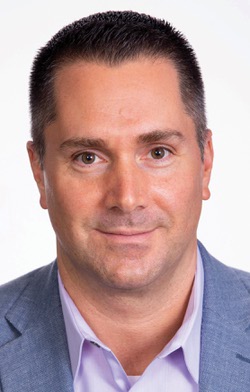Every company in every industry is facing an acute labor shortage, says Todd Mayhew, senior vice president of human resources and internal communications at Credit One Bank.
Banking is no different.

Todd Mayhew
“I read a recent study that over half of American workers will be looking for a new job over the next 12 months, and the numbers are even higher for Gen Zers and Millennials who comprise the biggest demographic of the workforce,” Mayhew said.
Mayhew said a bank or other company that offers a compelling employee value proposition will be positioned to win in the war for talent—offering rewarding work, competitive pay and benefits, and the ability to build their careers in a stable environment.
Having recently finished his first full year in Las Vegas, Mayhew discussed with us the evolution of HR, the benefit of developing emotional intelligence on the job, and his passion for the YMCA.
How has the pandemic altered your day-to-day work life and your perspective on the future of banking?
Because we’re an essential service, providing the means for millions of Americans to make critical purchases during these trying times, our office has remained open. Of course, we have instituted several measures to keep our employees safe, which has altered the typical workplace dynamic. For instance, masking and social distancing are an everyday part of life. Nevertheless, our employees and our bank have prospered with the connectivity and collaboration that are the hallmark of an in-person workplace.
The pandemic has simply accelerated the trends that have been at play in banking over the past decade or so. Customers want a digital experience that allows them to interact with their financial institutions at their convenience and without having to set foot into a branch or office. Companies like ours have responded by making investments in technology.
How has HR evolved in the time since you started your career until now?
The use of technology and analytics has exploded, which has helped the function to become more efficient and provide data-driven insights to organizations’ leadership on human capital matters. What has kept me in the function for all of these years is the diversity of hats you wear as an HR leader—on any given day, you’re part strategist, tactician, lawyer, counselor, analyst, etc. It’s truly a unique vantage point on the business that has kept me engaged over my career.
What is the best business advice you’ve received?
Early in my career, my boss pulled me aside after a team meeting during which I had expressed some concerns and hadn’t realized how my comments were being received. My boss helped me to see that even though I was junior, my words mattered—they had created a negative resonance across the team that could have impeded creativity and progress. Moreover, she helped me to realize that I was empowered and capable of changing the very things about which I had concerns.
That “fireside chat” set me down a path to learn about emotional intelligence and, with my boss’s encouragement, I read all I could on the topic. I would say that early intervention became a career accelerant for me, as I learned how to be a better employee and leader through the awareness and management of my emotions and the emotions of those around me. Since the human brain is hardwired to be emotional first and rational second, I remain grateful for that early lesson; it has helped me immeasurably during the most challenging of situations I’ve faced in my career.
Tell us about your work with the YMCA.
I have always admired what the YMCA does for the communities in which it operates. I have an early memory of a family friend who fell on hard times and received tremendous support from the Y to get back on his feet. I also have fond childhood memories of participating in Y activities and, not long after my son was born, we took him to the local Y for swim lessons. Roll the tape forward to a year ago, when an opportunity came up for me to join the board of the YMCA of Southern Nevada, I jumped at the chance.
I continue to be impressed by what the Y does for families across the community. For example, when the pandemic hit and schools went remote, parents were challenged to balance between work and home-schooling. The Y leapt into action with the Y Cares program, offering safe, nurturing and cost-effective childcare that helped kids keep up with their virtual learning, and parents keep up with the demands of their jobs. This example is just one of many that demonstrates the tremendous impact the Y has on families.
What are you reading right now? Or binge-watching?
I always have a lot going on, so I tend not to watch a lot of TV—I confess, I don’t even have Netflix. I recently finished the book Talent Wins by Ram Charan, Dominic Barton and Dennis Carey. I recommend this book highly for any CEO, finance leader or HR leader. It makes a very compelling case for transforming how companies acquire, manage and deploy talent given the realities of increasingly digital and complex organizations.
What do you do after work or on weekends?
Fitness has always been a big part of my life, so I make sure to get to the gym regularly. My son and I have been taking guitar lessons for years. It has been fascinating to see the musician he is becoming—while my skills remain at the novice level, and that’s being charitable.